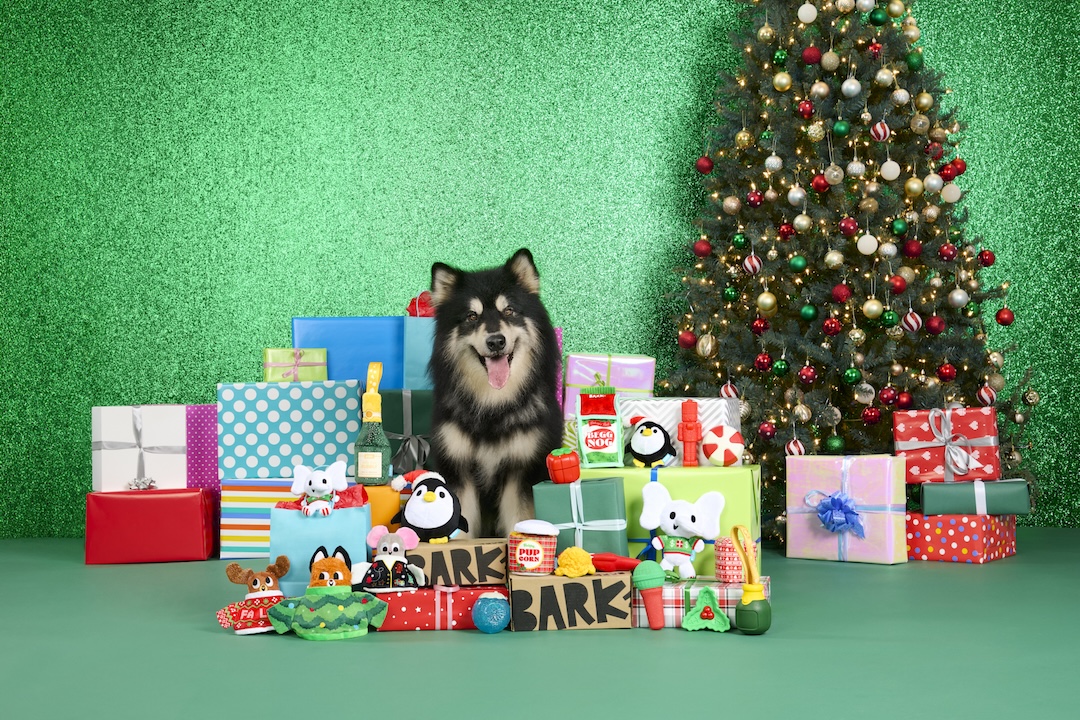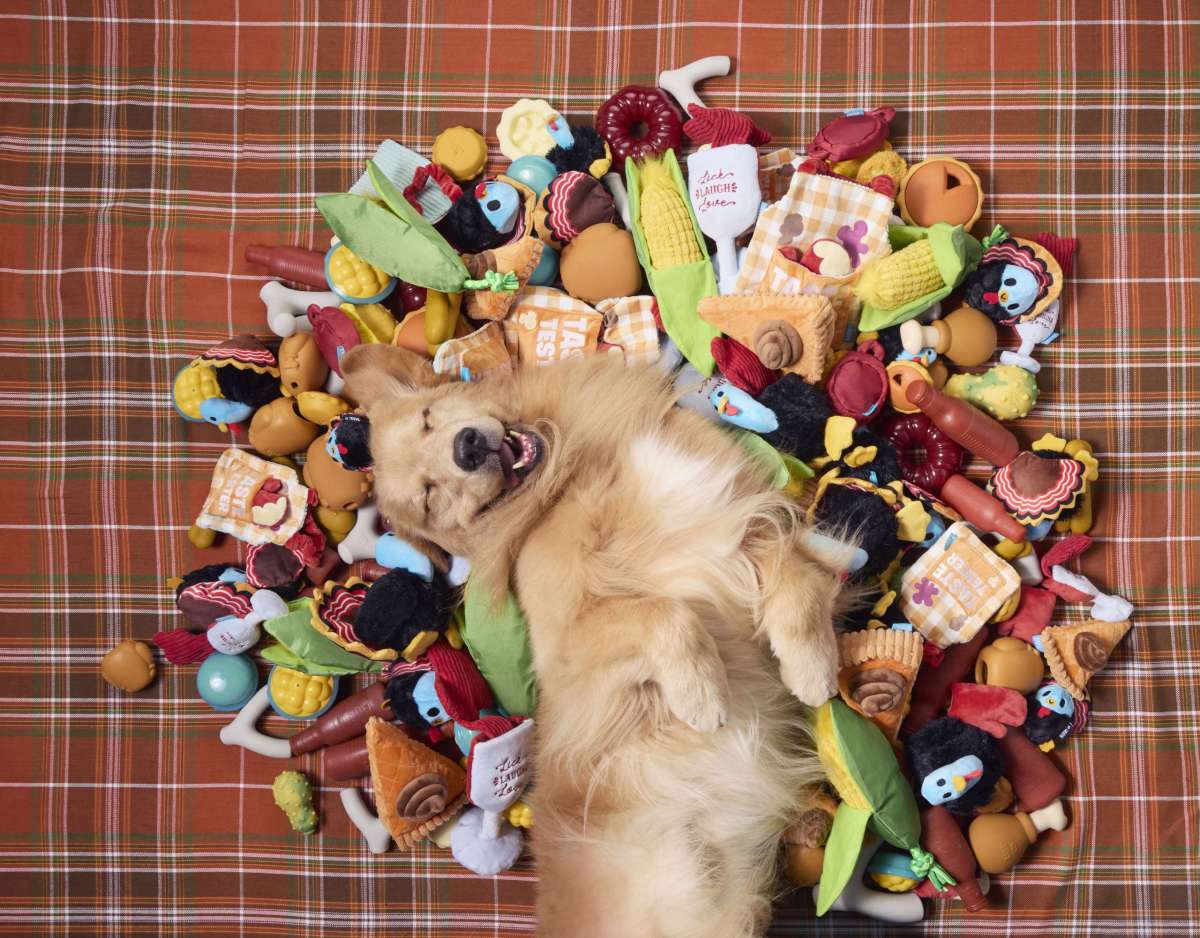Famously small, Chihuahuas have a truly colossal personality. Classified as a toy breed, these pint-sized pups are chock-full of confidence and attitude. In fact, they’ll likely hold their own amongst dogs ten times their size. To the ones they love, Chihuahuas have a reputation for being intensely loyal, protective, and sweet dogs.
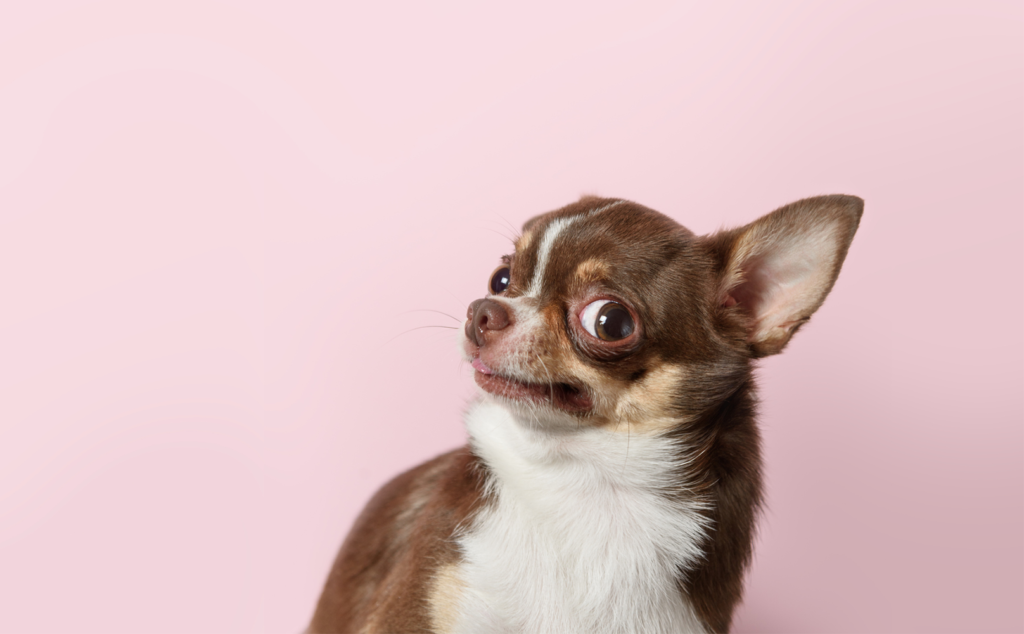

Although these little bruisers aren’t for everyone, Chihuahuas can make excellent companions. If you’re looking for love in miniature form, the Chihuahua might be the right dog for you.
Breed Overview
Also Known As…
Chi, Chi-chi, Chi-ken nugget, Mr. Big, hell-raiser, ankle-biter, “That’s the biggest little dog I’ve ever seen!”
What Is The History Of The Chihuahua?
Chihuahuas are one of the oldest dog breeds in the world. Mexico’s national symbol originated in Chihuahua, their largest state. Mexicans started selling these pups to American tourists in the late 1800s when they crossed the border from Texas. It was during these exchanges that the dog picked up the name of its home state.
It’s speculated that Chihuahuas are the descendants of the ancient dog, Techichi. These thin-framed companion dogs roamed pre-Columbian Mesoamerican civilizations. Archaeologists have also discovered figurines of these dogs, which illustrate the similar characteristics they share with the modern day Chihuahua.
Related Article: 10 Extinct Dog Breeds You Never Knew Existed
Later, during the period of the Mayans (1800 BC to 900 AD) these 10–20 pound canines were often found buried with their humans. The Aztecs (1200s BC) may have had a cold reputation, but they adored teeny tiny dogs, and so selectively bred the Techichi to create the modern pocket-sized Chis.
Some historians postulate that Chihuahuas were created through the breeding of Techichi dogs and Chinese crested dogs, which generally weigh in at around 10 pounds. Others argue that they’re of European descent. Still, new DNA evidence supports the theory that Chihuahuas are solely the great-great-great (great) grandchildren of ancient Mexican dogs. Regardless of where the tiny titans originated, they can be found all over the world today as our companions.
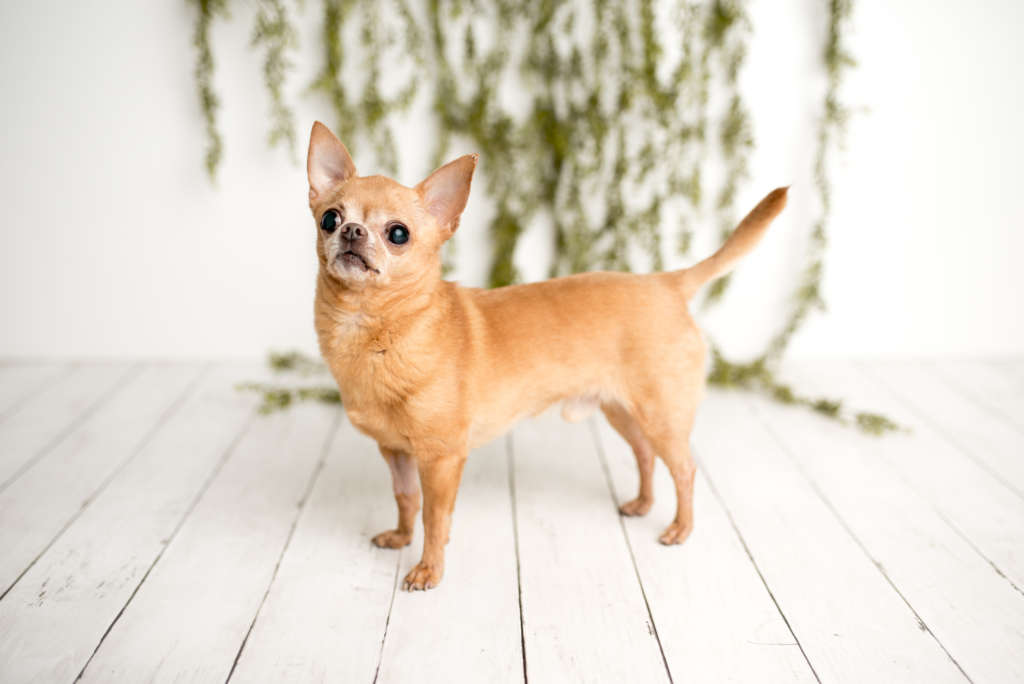

How Big Do Chihuahuas Get?
Height: 5–8 inches tall
Weight: Generally not exceeding six pounds.
How Long Do Chihuahuas (Generally) Live?
Chihuahuas are one of the longest-living dog breeds with an average life expectancy of 14–16 years.
What Is A Chihuahua’s Temperament & Personality Like?
As Genie once said, “Phenomenal cosmic powers!… Itty bitty living space.” That’s a Chi in a nutshell (figuratively—they’re small, but not lamp small).
Chihuahuas don’t receive a lot of recognition for their gentle natures, but perhaps they should! This breed grew in popularity during the early 1900s, partially due to their sweet dispositions and adoration of their humans. Still, their impressive “big dog” personalities get a lot of attention for obvious reasons. Chihuahuas are clever dogs that will rule your home (and your neighborhood) in the absence of other leadership.
They’re are also known to be highly devoted to just one or two people in their families. Even though they’re less likely to be a friend to everyone they meet, they’re still often fun-loving and entertaining. Plus, Chihuahuas make excellent alarm systems.
Do Chihuahuas Bark A Lot?
They’ll likely yap at any potential intruder—be it the mailman, the neighbor’s cat, or a squirrel. When you’re that small, you have to make a big impression somehow!
Are Chihuahuas High Energy?
Depending on the athleticism and physical capabilities of each individual dog, Chihuahuas may benefit from a slow daily trot to the park. Others may enjoy two short, brisk walks per day. The majority of Chis enjoy running, playing, and chasing toys in a small, confined space.
But keep in mind that, with this breed, there is a risk of overexertion. If a Chihuahua starts to pant, lies down, or is struggling to keep up, it’s time to scoop her up and carry her home.
Good With Kids? Cats? Dogs?
One of the many enjoyable aspects of living with a Chihuahua is watching them boldly prance around the room, greeting any familiar person who arrives. They’re generally wary or even standoffish with strangers on the street, but can be socialized to be more accepting.
Chihuahuas are too delicate to deal with roughhousing from young children (not that any dog should have to deal with roughhousing). They also might growl, snap, or bite when they feel threatened by kids. As they’re far more susceptible to injury due to their small stature, it’s best to have Chihuahuas around older, well-behaved children.
That said, around responsible and calm kids, Chihuahuas can be wonderful dogs. They often like playing fetch, cuddling on the couch, and taking a stroll around the block. Just watch where you step when you share a home with them!
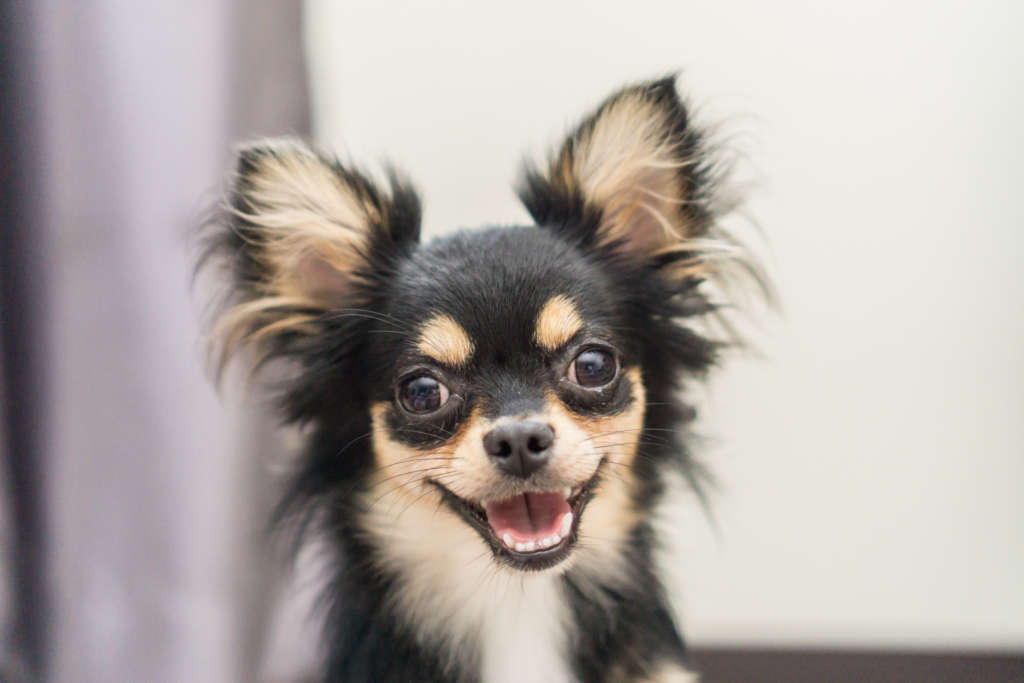

While some Chihuahuas can become over-sheltered and develop low self-esteem or fear, they’re typically friendly with other dogs and cats. That stated, low confidence—as well as overprotectiveness and dominance—can all manifest as reactivity. Like all dogs, this breed needs to be socialized and trained before visiting the dog park or rooming with a cat.
It’s also important to keep Chihuahuas’ safety in mind around other animals at all times. Extra small or meek-mannered Chihuahuas are especially vulnerable to attack.
Be Mindful Of Their Size
Due to the Chihuahua’s excessively small size, it’s important to keep in mind the threat of bad weather and predators. Special care must be taken when the temperature drops in the winter, as Chihuahuas have thin coats and low body fat.
Furthermore, these small dogs are so tiny that they’re vulnerable to wildlife. If you’re in an area where birds of prey, coyotes, or raccoons may be present, always keep your Chihuahua on a leash directly next to you, and never leave them unattended in a yard.
Are Chihuahuas Hard To Train?
Don’t let the small noggin fool you—alert and vivacious, Chihuahuas are highly trainable. Despite their intimidating attitudes, Chihuahuas are often eager to please their human companions. With positive and clear training practices, most Chihuahuas learn a variety of tasks and behaviors quickly. They’ll also likely excel in obedience classes, as long as they’re not overwhelmed by much larger, over-excited dogs.
Chihuahuas do need a strong leader (that’s you!). When they’re itty-bitty puppies, people can make the mistake of letting Chihuahuas do want they want. Every dog deserves to be well socialized and trained so they can exist peacefully with others. Without direction and guidance, Chis are liable to take over your home and rule with a feisty, furry fist.
Do Chihuahuas Have Any Health Issues?
This breed is generally healthy. Over the decades, though, as Chihuahuas have been bred to become smaller and smaller, some medical problems have arisen. If you plan on acquiring a Chihuahua from a reputable breeder, it’s important to screen for common health issues, which include heart problems, eye disease, patellar luxation, and epilepsy.
Pay special attention to treats when it comes to a dog this small—the calories add up quickly when you’re only 6 pounds. Chihuahuas are more prone to obesity than other breeds due to their pint-sized proportions. On top of regular daily exercise, this dog should receive a high quality, balanced diet (with treats being no more than 10% of their daily caloric intake).
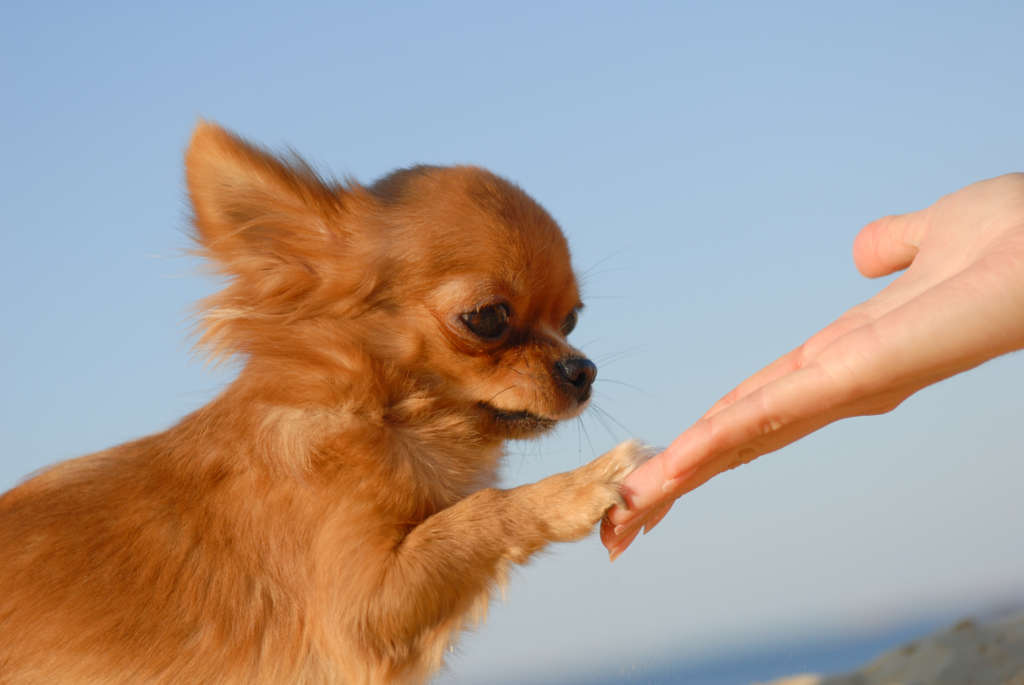

Related Article: How To Get Picky Dogs To Eat (And Love) Dry Food
Chihuahuas are also at higher risk for dental disease1, since their small mouths mean the teeth are more crowded than in larger breeds. It’s essential that they receive routine teeth-brushings and yearly professional dental cleanings to avoid infection in the mouth. If infection occurs as a result of advanced dental disease, bacteria can spread to the heart and other body systems.
Beware Of Terms Like “Teacup” Chihuahua
When choosing a responsible breeder, you’ll also want to stay away from buzzwords like “teacup” or “miniature.” These often indicate Chihuahuas that have been bred down to become even smaller, disregarding the health issues that occur as a result.
Given that these variations in breed aren’t recognized by any official dog breed organizations, it’s also likely that breeders are simply charging more money for the same type of dog. The only recognized differentiations in Chihuahuas are variations in their coat (smooth-coat or long-haired) and the shape of their head (“deer head” or the rounded “apple head”).
Do Chihuahuas Need To Be Groomed?
Chihuahuas come in two different coat varieties: smooth-coat or long-haired. The smooth-coat Chihuahua needs very minimal brushing to keep them looking dapper. Long-haired Chihuahuas require more maintenance. Try to brush them at least once a week to avoid any mats or tangles forming.
While this breed usually keeps itself pretty clean, occasional bathing will also help them continue looking their best.
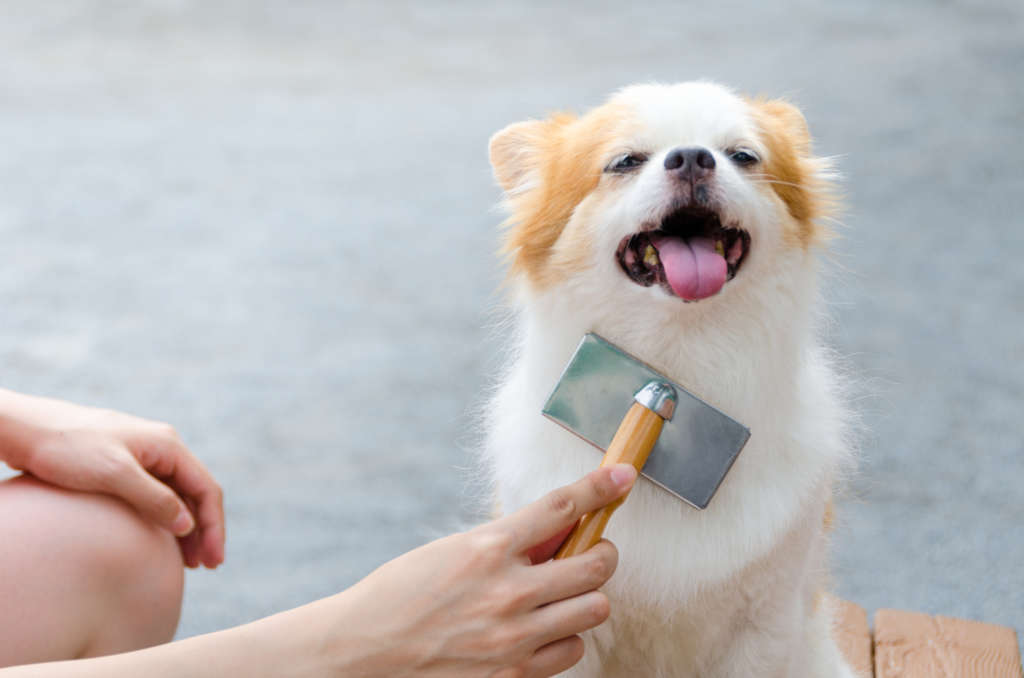

How Much Does It Cost To Care of A Chihuahua?
Exact cost is difficult to determine, but at a minimum, expect to spend around $500+ per year.
Food
Aside from the cost to acquire the dog itself, Chihuahuas are medium-to-large size dogs that eat anywhere from 1/2–1+ cups of food per day. Expect a quality bag of food to cost around $20–$60+ per bag every few weeks to a month or so depending on how much they eat.
BARK Food makes food just for Chihuahuas and Chi mixes! From healthy omega fatty acids and probiotics to support healthy digestion, to plenty of joint-friendly glucosamine and chondroitin, drool is inevitable. Get 25% off and free shipping with code 25FOOD today!


Routine Vet Care (Healthy Dog)
Take into account the cost of maintaining proper vet care as well. The average veterinary appointment will run you at least $50 each visit, not including treatment (vaccines, heartworm tests, etc.) Vets typically recommend a yearly wellness visit, and that doesn’t include treatment that may pop up for issues along the way, like x-rays, antibiotics, or surgeries.
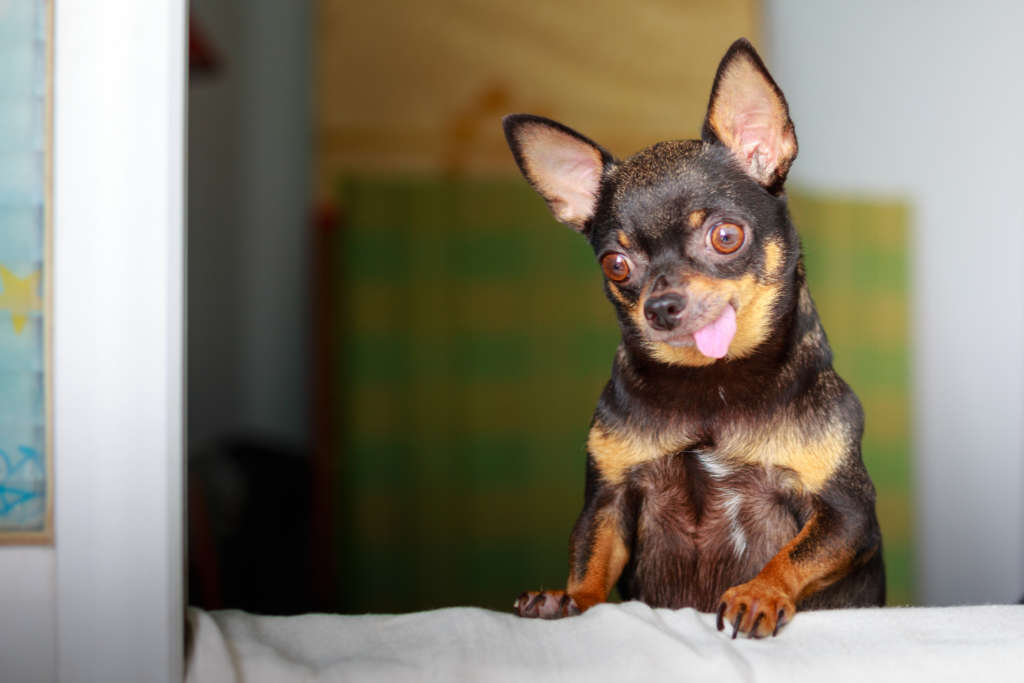

Preventative Medications
Monthly heartworm, flea, and tick medications typically cost $100+ for a year’s worth of doses depending on your pup’s weight.
Grooming
Grooming costs for a Chihuahua are on the lower end if you choose to groom yourself. You’ll need a dog-friendly shampoo for bathtime, a brush designed for their coat, tooth-brushing supplies, toenail clippers, and an ear-cleaning solution with cotton balls, at minimum. If you choose to have a groomer take care of these tasks, a single session may cost around $25–$40.
Toys, Treats, Beds, & Accessories
Toys, treats, beds, and accessories (leash, collar, bowls, training tools) add up as well, but they’re definitely the most fun to shop for!
A monthlyBarkBox, for example, starts at $23/month and includes 2 toys, 2 full-size bags of treats, and a tasty chew (DOUBLE YOUR FIRST BOX FREE!). A tougher,Super Chewer subscription starts at $29 per month with 2 fluff-free, durable toys, 2 full-size bags of treats, and 2 meaty chews (DOUBLE YOUR FIRST BOX FREE!)
Small beds cost around $25-$50+ depending on size and style, and walking accessories and training supplies usually clock in around ~$40 minimum for such small pups.
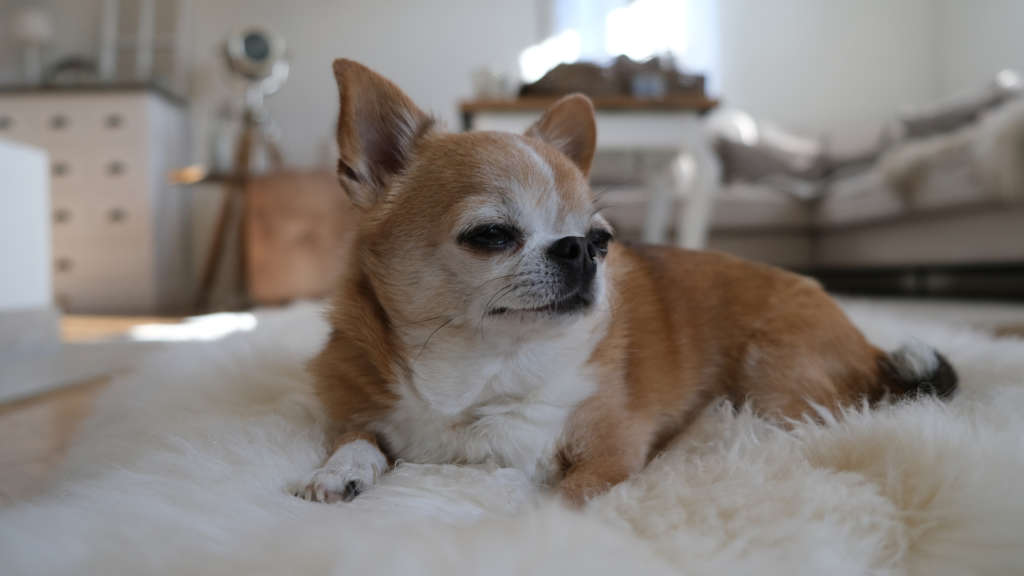

Other normal costs associated with caring for a Chihuahua include:
- Dog walker (~15–$25/visit)
- Daycare/boarding (~$25 min for one day of daycare)
- Training classes (~$200+)
- Supplements, like hip & joint or skin & coat ($25+/month)
- Unexpected costs, like emergency care (~$500–1000+)
Related Article: Is BARK Food Worth It? New Breed-Inspired Recipes For Dogs’ Unique Needs
Sources
1Wallis, C., Saito, E. K., Salt, C., Holcombe, L. J., & Desforges, N. G. (2021, July 19). Association of periodontal disease with breed size, breed, weight, and age in pure-bred client-owned dogs in the United States. The Veterinary Journal. Retrieved March 10, 2022, from https://www.sciencedirect.com/science/article/pii/S109002332100112X



